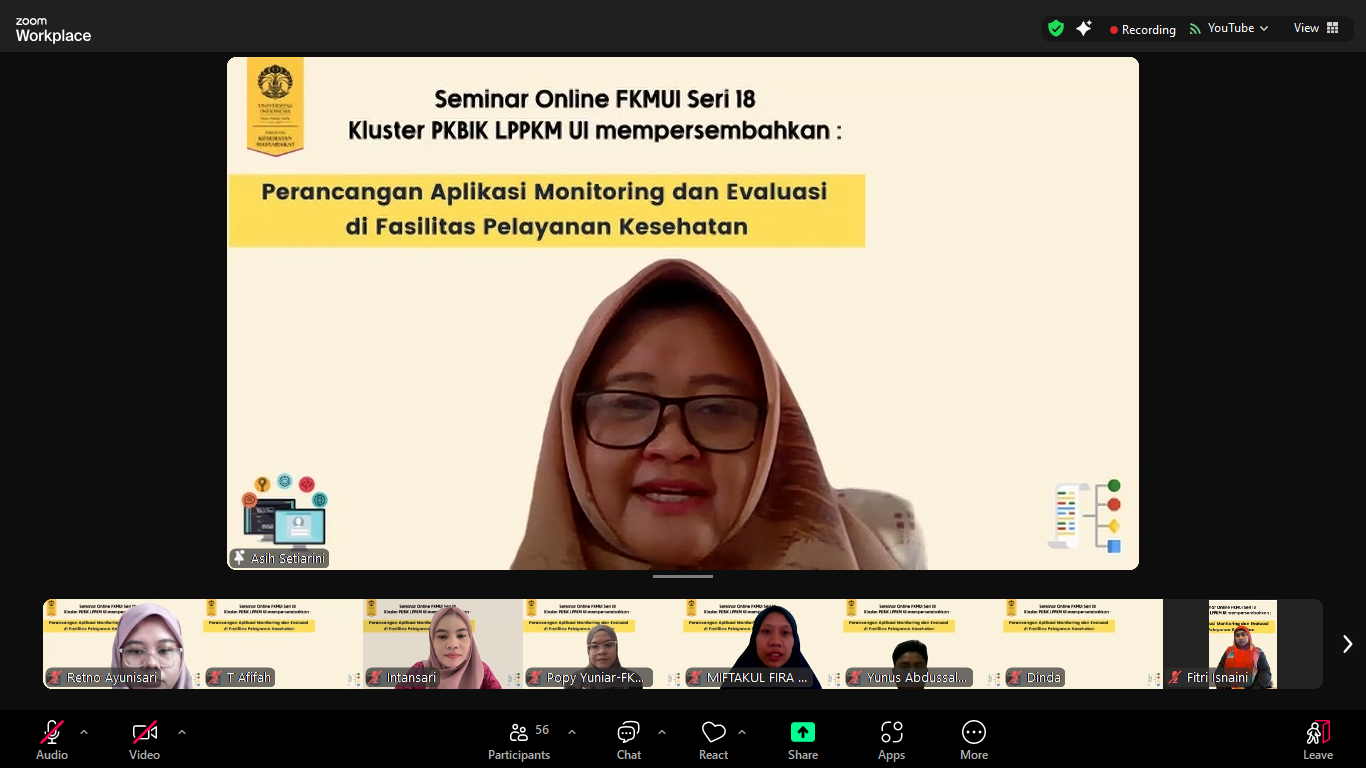On Saturday, September 28, 2024, the Cluster for the Study of Biostatistics and Health Informatics (PKBIK) at the Faculty of Public Health (FPH) UI hosted the 18th Series of the Online Seminar (SEMOL) with the theme “Designing Monitoring and Evaluation Applications in Health Service Facilities,” featuring expert presenters and discussants.
Dr. Ir. Asih Setiarini, M.Sc., the Vice Dean for Education, Research, and Student Affairs at FPH UI, stated that designing monitoring and evaluation applications in health service facilities is crucial and urgent in today’s digital era. “The design of monitoring and evaluation applications in health service facilities is one of the efforts to achieve effective, efficient, and accountable services. I hope this online seminar will provide insights and serve as a constructive discussion to continue developing better public health research and practices,” Dr. Asih said in her opening remarks.
In the first presentation, Intansari, S.ST., M.K.M., discussed “Prototyping Monitoring and Evaluation Information System for Electronic Medical Records (EMR) in Health Service Facilities: A Case Study of Dr. Soetomo Hospital Surabaya.” Intansari explained that information systems play an important role in implementing monitoring and evaluation of Electronic Medical Records (EMR).
“All health service facilities must implement EMR. Once implemented, data accuracy issues typically arise as a major challenge. Therefore, identifying opportunities is critical when building an application to ensure its sustainability,” explained Intansari.
Electronic Medical Records (EMR) serve as the primary source of data in healthcare, ranging from demographic information to crucial patient data. EMR requires monitoring and evaluation because it is related to improving diagnostic and treatment accuracy, compliance with regulations, and risk management.
“The development direction of the EMR monitoring and evaluation system in health service facilities will be directly integrated with EMR and Hospital Information Management Systems (SIMRS). This can contribute to the development of data analysis modules and can also be developed into a warning system linked to potential claim disputes. Additionally, it can evolve into Cloud Computing, Machine Learning, and even AI for assistance in reviewing medical records,” Intansari elaborated on the benefits and advantages of the EMR monitoring and evaluation system.
Furthermore, Miftakul Fira Maulidia S.Tr. Keb., M.K.M., the second presenter at SEMOL Series 18, presented the topic “Evaluation of the Utilization of the E-Kohort Application for Maternal and Child Health (KIA) Programs in Malang Regency” based on an analysis study.
E-Kohort is an application developed by the Ministry of Health in 2020 and implemented in 2021 in 15 regencies/cities, including Malang City. The application integrates the cohort register previously used by healthcare providers, particularly midwives, which was still paper-based.
Miftakul Fira Maulida explained that the E-Kohort application needs to undergo evaluation to meet the system’s life cycle needs, maintain system performance and efficiency, and implement continuous improvements. “It turns out that, as of the time this study was conducted, there has been no evaluation of E-Kohort based on user perceptions regarding the application’s success in improving performance,” Miftakul Fira noted.
The discussions from both presenters were further elaborated by Popy Yuniar, S.K.M., M.M., Ph.D., a faculty member of Biostatistics and Health Informatics at FPH UI. In her discussion, Popy emphasized the importance of system analysis in the process of developing models that illustrate the construction of an EMR system.
“System analysis is crucial as a problem solver. Currently, there is still a lack of internal involvement when building information systems. In reality, the role should be shared by everyone, not just the vendors or developers. Communication processes are also extremely important. There will be no success in system development if there is no interaction between parties, which is why the framework must be followed correctly,” Popy Yuniar clarified the challenges mentioned by the first presenter.
“Regarding the evaluation approach, it should indeed be conducted as an assessment of a system’s effectiveness, especially for systems with large investments. The examination focuses on a hypothesis that all levels of intensity can affect the performance of an information system, from organizational support to user acceptance. Thus, making improvements according to priority is the evaluation that can be carried out,” Popy Yuniar concluded the material presented by the second speaker.
Through SEMOL FPH UI Series 18, which was attended by students and the general public, PKBIK FPH UI hopes to provide valuable insights into designing good applications or information systems in health service facilities. (ITM)

